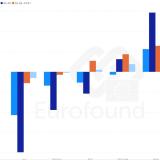
Beskæftigelse og arbejdsmarkeder
Beskæftigelse og arbejdsmarkeder er en af de seks hovedaktiviteter i Eurofounds arbejdsprogram for perioden 2021-2024. Eurofound vil fortsat fungere som ekspertisecenter for overvågning og analyse af udviklingen på arbejdsmarkedet, navnlig da de europæiske arbejdsmarkeder står over for store udfordringer i kølvandet af covid-19. Instituttets dataindsamling og forskning vil fokusere på pandemiens konsekvenser for arbejde og beskæftigelse, og hvordan et velfungerende og inklusivt arbejdsmarked kan fastholdes.
Eurofounds forskning vil i løbet af 2021-2024 give et vigtigt indblik i udfordringerne og udsigterne for beskæftigelsen og arbejdsmarkederne i EU. Eurofound spiller en vigtig rolle i overvågningen af tendenser på arbejdsmarkedet og virkningen heraf for forskellige grupper af arbejdstagere.
Forskningen vil generelt fokusere på arbejdsmarkedets ændrede struktur ved hjælp af Eurofounds veletablerede overvågningsinstrumenter European Jobs Monitor (EJM), European Restructuring Monitor (ERM) og data fra Eurostat. Med den høje arbejdsløshed, der forventes i nogle lande, regioner, sektorer og erhverv, som også berører de mest udsatte og sårbare arbejdstagere, vil disse instrumenter bidrage til at identificere sektorer, erhverv og kvalifikationer i vækst og i tilbagegang. ERM vil også fortsat undersøge omfattende omstruktureringer , lovgivnings- og støtteinstrumenter samt foranstaltninger, som arbejdsmarkedets parter og offentlige myndigheder har udviklet for at hjælpe arbejdstagere med at skifte mellem job eller sektorer.
Eurofound vil også fokusere på arbejdskraftmangel og underudnyttede menneskelige ressourcer og talent i visse sektorer og erhverv – forstærket under covid-19 – ved at undersøge politiske indgreb og virksomhedspraksisser. Specifikke emner vil omfatte ubalancen mellem udbudte og efterspurgte kvalifikationer , arbejdstid , geografisk eller erhvervsmæssig mobilitet, og integration af migranter , samt grupper, der er underrepræsenteret på arbejdsmarkedet, f.eks.unge, kvinder og personer med handicap . Eurofound vil ligeledes se nærmere på sektorer, der traditionelt er ramt af mangel på arbejdskraft, og hvor problemet presser sig mere og mere på som følge af pandemien. Denne aktivitet vil indgå i det forberedende arbejde til den næste udgave af den europæiske virksomhedsundersøgelse (ECS) .
Eurofounds samarbejde med Europa-Kommissionens Fælles Forskningscenter (JRC) vil også fortsætte på dette område. Forskning i omstrukturering vil bidrage til aktiviteterne under Den Europæiske Fond for Tilpasning til Globaliseringen (EGF) og Den Europæiske Socialfond+ (ESF+). Forbindelserne med søsteragenturet Cedefop og Den Europæiske Arbejdsmarkedsmyndighed vil blive undersøgt, for så vidt angår kvalifikationer og arbejdskraftmobilitet i forbindelse med beskæftigelsespolitikker, der har til formål at tackle manglen på arbejdskraft.
- Infografik: Beskæftigelse og arbejdsmarkeder i EU





























